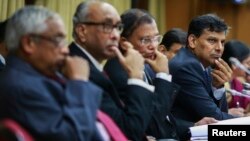India's top bankers have gathered in the western city of Pune in a one-of-a-kind huddle to discuss long-pending reforms vital to improving the health of ailing public sector banks in Asia's third-largest economy.
The country's more than two dozen inefficient state-run banks have been constrained by a pile of bad loans and corporate governance issues. They also lag their private sector rivals in profitability.
For years, political interference and union opposition have thwarted major reforms. Many industry observers remain sceptical about big changes being implemented in the near future, especially with the economy still recovering from its worst slowdown since the 1980s.
If reformed, however, the country's mega state lenders offer investors the best exposure to any sustained upswing in India's economy.
"When the country is trying to achieve accelerated growth in economic development it is absolutely essential that banking reforms are thought about, deliberated upon and implemented lso," Hasmukh Adhia, financial services secretary in the finance ministry, said on Friday.
Besides the heads of all public sector banks, the two-day meeting ending on Saturday will also be attended by Prime Minister Narendra Modi, Finance Minister Arun Jaitley and Reserve Bank of India Governor Raghuram Rajan.
The issues to be discussed include industry consolidation, restructuring of state banks for better efficiency and governance, as well as asset quality.
Instead of "imposing any recommendation", the government and central bank will be consulting with all stakeholders in the state banking sector, Adhia told reporters in Pune.
State lenders recorded the highest level of stressed loans at 12.9 percent of their total advances in September last year, while the same ratio for private sector banks was at 4.4 percent, according to the latest central bank data.
State banks account for more than 70 percent of total outstanding loans in the sector.
Public sector lenders are estimated to need as much as $60 billion in capital over the next four years to meet upcoming global regulations and to build a buffer against rising bad loans.





